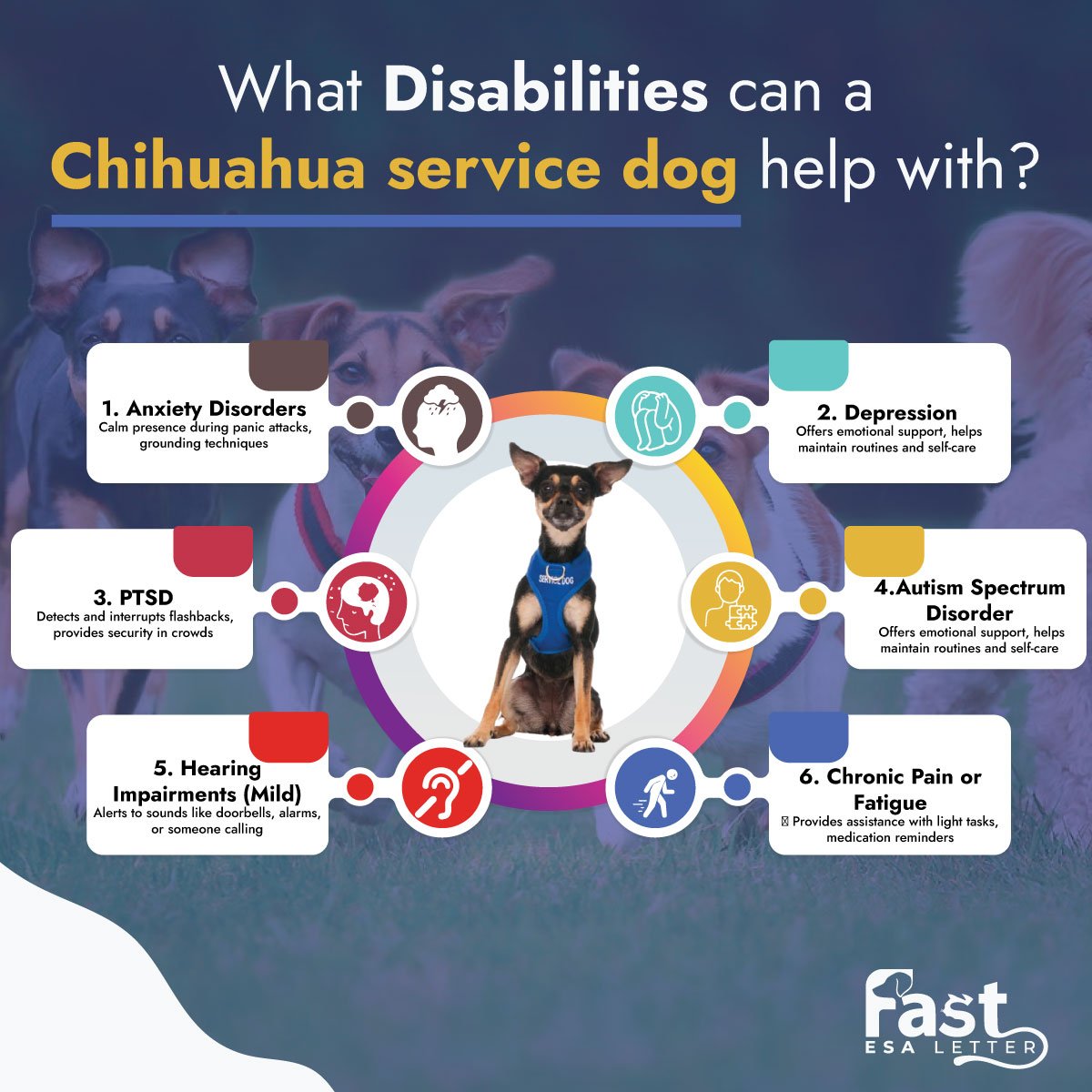Can a Chihuahua Be a Service Dog?

Robert Clendenin, MD
Though not suited for mobility tasks, Chihuahuas can be service dogs, offering alertness, emotional intelligence, and companionship. Let’s explore why these little companions can make a big impact.

What Qualifies a Dog as a Service Dog?
To qualify as a service dog, the animal must be trained to perform tasks directly related to the handler’s disability. This can include guiding the visually impaired, detecting medical emergencies, providing psychiatric support, or assisting individuals with mobility challenges.
Can Chihuahuas Qualify as Service Animals?
What Disabilities Can A Chihuahua Service Dog Help With?

Psychiatric Conditions
Chihuahuas are highly intuitive and can sense emotional distress, making them excellent for individuals with psychiatric disabilities such as:
- Anxiety Disorders: They provide deep pressure therapy (DPT) by snuggling close, reducing panic symptoms.
- PTSD (Post-Traumatic Stress Disorder): They interrupt flashbacks, wake owners from nightmares, and offer grounding techniques during distressing moments.
- Depression: Their affectionate nature encourages emotional connection, helping reduce loneliness and promoting a sense of stability.
Hearing Impairments
Chihuahuas may be small, but they have sharp hearing and can be trained to alert individuals with hearing impairments by responding to:
- Doorbells, alarms, and ringing phones by nudging their owner.
- Someone calling their name or an unusual sound in their environment.
- Danger signals like smoke alarms or sirens, ensuring their owner stays aware of emergencies.
Seizure Detection & Response
Though not all dogs have this ability, some Chihuahuas can sense seizures before they happen. They may notice subtle changes in body language, scent, or behavior before an episode occurs. A trained Chihuahua service dog can:
- Alert their owner before a seizure begins, allowing time to prepare.
- Retrieve medication or a medical device.
- Stay close to provide comfort during and after an episode.
Diabetes
Chihuahuas have a remarkable sense of smell and can detect blood sugar fluctuations in individuals with diabetes. A trained diabetic alert dog can:
- Sense hypoglycemia (low blood sugar) or hyperglycemia (high blood sugar) through scent cues.
- Alert their owner or caregivers to take necessary action.
- Fetch glucose tablets or an emergency kit if needed.
Mobility Assistance (Minor Tasks)
Although Chihuahuas are too small to provide full-body support, they can still assist individuals with limited mobility by performing small but impactful tasks:
- Retrieving lightweight objects like keys, medicine bottles, or a phone.
- Pressing buttons to open automatic doors or signal for help.
- Providing stability while sitting or getting up by acting as a grounding presence.
How to Get a Chihuahua as a Service Dog?
If you want a Chihuahua service dog, follow these steps to ensure they meet the legal, training, and behavioral requirements for service animals.
Step 1: Determine Eligibility for a Service Dog
To qualify under the Americans with Disabilities Act (ADA), you must have a physical, psychiatric, or medical disability that a service dog can assist with. Chihuahuas are best suited for tasks requiring alertness, emotional intelligence, and companionship rather than physical strength.
Step 2: Adopt or Train Your Own Chihuahua
A service dog must be trained to assist with a disability. You can either:
- Adopt a pre-trained service Chihuahua: Organizations train small service dogs, but they can be costly.
- Train your own Chihuahua: Requires consistent obedience, task-specific training, and public access training.
Note: Temperament matters! Highly reactive or aggressive “psychotic Chihuahuas” are not ideal candidates. A professional temperament assessment can help determine suitability.
Step 3: Obtain a Psychiatric Service Dog (PSD) Letter
If using your Chihuahua as a psychiatric service dog, a PSD letter from a licensed mental health professional (LMHP) can provide legal protection. To get one, schedule a consultation session, explain how your Chihuahua assists with your condition (e.g., panic attack detection), and receive your official PSD letter. This may be required for airline travel, housing accommodations, and public access disputes.
Step 4: Optional Accessories
While not legally required, using a service dog vest helps signal their role in public, reducing confusion and unwanted interactions. A custom ID tag or harness can further clarify their purpose, especially in crowded areas. Some owners also use leashes with “Service Dog” labels to ensure better recognition and accessibility.
A Chihuahua service dog may be tiny, but its impact can be life-changing. Whether you adopt a pre-trained service dog or train your own, these intelligent and loyal companions can provide invaluable support for individuals with disabilities.
Pros and Cons of a Chihuahua Service Dog
Pros:
- Compact and portable: Easy to transport and travel with, making them convenient service dogs.
- Highly intuitive: Strong emotional intelligence, making them excellent at sensing distress.
- Loyal and affectionate: Form deep bonds with their owners, providing consistent support.
- Low-maintenance needs: Require less exercise and space compared to larger service dog breeds.
- Ideal for apartment living: Their small size makes them well-suited for homes with limited space.
- Long lifespan: Chihuahuas can live 12–20 years, providing long-term companionship.

Cons:
- Limited physical ability: Not strong enough for mobility assistance or physical support tasks.
- Can be stubborn: May be more challenging to train compared to traditional service dog breeds.
- May not be recognized as a service dog: Due to their small size, some public spaces might question their legitimacy as working dogs.
- Can be prone to anxiety: Some Chihuahuas can be nervous or reactive in unfamiliar environments.
Still wondering, do Chihuahuas make good pets or service dogs? It depends on the needs of the individual. While they may not replace larger breeds for mobility support, their ability to provide emotional grounding, alertness to medical conditions, and assist with psychiatric disabilities makes them valuable companions.
Can I Train My Own Chihuahua To Be a Service Dog?
Yes! You can train your own Chihuahua to be a service dog, but it requires commitment, patience, and structured training. Unlike emotional support animals, a service Chihuahua must be trained to perform a specific task that directly assists with a disability.
Steps to Training a Chihuahua Service Dog:
- Assess Your Chihuahua’s Temperament: Ensure they have the right qualities for service work.
- Basic Obedience Training: Teach commands like sit, stay, come, and heel.
- Task-Specific Training: Train them to assist with medical alerts, anxiety interventions, or hearing assistance.
- Public Access Training: Ensure they behave well in crowded places and remain calm under stress.
If you’re unsure where to start, consider working with a professional service dog trainer experienced in training small-breed service dogs.
Where Can I Adopt a Chihuahua Service Dog?
Finding a pre-trained Chihuahua service dog can be challenging, as most organizations train larger breeds for service work. However, some places specialize in training small service dogs for psychiatric and medical needs.
- Service Dog Organizations: Some programs offer trained small-breed service dogs.
- Animal Shelters & Rescues: You may find a Chihuahua with the right temperament for training.
- Reputable Breeders: If starting from puppyhood, choose a breeder focusing on temperament.
Adopting vs. Training:
- Adopting a trained Chihuahua service dog can be expensive but saves time.
- Training your own Chihuahua allows for a stronger bond and can be more affordable.
Regardless of your path, ensuring your Chihuahua meets service dog requirements and is properly trained will help them become a reliable and supportive companion.
Final Thoughts
Whether as a PTSD Chihuahua, an emotional support Chihuahua, or a therapy dog, these tiny yet mighty companions provide comfort, security, and independence for those in need.
Frequently Asked Questions (FAQs)
Can a Chihuahua Be a Service Dog For Anxiety?
Can a Chihuahua Be a Service Dog For PTSD?
Are Chihuahua Service Dogs Allowed Everywhere?
Does A Chihuahua Make A Good Service Dog?
Are Chihuahuas Good For Mental Health?
Can A Chihuahua Be A Guard Dog?
Can A Chihuahua Be An Emotional Support Dog?
Can Chihuahuas Be Therapy Dogs?
Do Chihuahuas Make Good Pets?
Do Chihuahuas Make Good Family Pets?
How Long Does It Take To Train A Chihuahua Service Dog?
Are Chihuahuas Healing Dogs?
Post Author
Prince Sharma
Related Articles
No Results Found
The page you requested could not be found. Try refining your search, or use the navigation above to locate the post.
Live Free with Your ESA!
An ESA Letter Unlocks Freedom!



